“Kya kaam ke naam par vote padta hai?” Do people vote for performance? This is the simple question Arvind Kejriwal is seeking an answer to—shorn of theory, or hifalutin ideology, a question meant to appeal to the common citizen. Delhi will vote again in early 2020, to get a government that will craft its destiny for the first half of the new decade. Kejriwal, a man who once deigned to loom much larger over India’s political landscape, has limited the horizon of his ambition. He wants only Delhi. There is stiff, and bitter, opposition though. The BJP wants desperately to break its 21-year long jinx and get a shot at power in the national capital. For the Congress, which ruled Delhi for 15 years under Sheila Dikshit and justly claims to have begun its transformation, it’s a fight for relevance in a purana qila. And yet, this is about much more than Delhi. For, this is no ordinary three-sided electoral fight.
Assembly Elections 2020: Does AAP Chief Arvind Kejriwal Have The X-Factor To Defend Delhi?
The politics and personality of Arvind Kejriwal—beaver-like, unputdownable, jack-in-the-box—is the X-factor that sets it apart.
The politics and personality of Arvind Kejriwal—beaver-like, unputdownable, jack-in-the-box—is the X-factor that sets it apart. He and his party, AAP, form a long, inscrutable side in this triangle. They evoke devotion and cause exasperation. They mutate, but also stay identifiably the same. They often flatter to deceive—making a lot of noise and then seeming to suddenly vanish from the stage. But on accounting day they turn up again, with a long list on the credit side. That’s why this fight is about more than Delhi: it’s a novelty in Indian politics, and neither the BJP nor the Congress quite know how to go about it. Both covet Delhi the old way, purely as territory. They may or may not breach the fortress wall, but their politics still seems out of the traditional playbook. And AAP, despite getting its hands dirty in actual politics, somehow retains the sense of carrying a new idea.
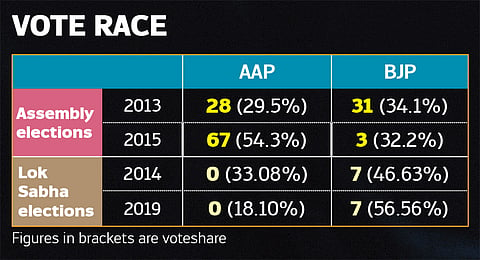
And Delhi has not been an easy laboratory to test new ideas. The sprawling metropolis teems with contradictions. It is India’s capital city, the seat of the Union government—housing all the markers of power. It is also home to millions of powerless: a vast, mobile demographic web that makes up its unorganised workforce of drivers, plumbers, electricians, peons, private security guards and domestic helps. Pulling up daily on a platform between the sprawling bungalows and shiny malls of the old and nouveau elite is this train from the real India out there. How to plan the infrastructure for such a dynamic thing in constant evolution?
In 2015, AAP had made a stunning sweep, with an IIT topper-like scorecard of 67/70. The wind in the sail had come from a huge sentiment against corruption, a desire for clean governance. The focus has subtly shifted now: Chief minister Kejriwal’s report card is more workmanlike than outright inspirational. A whole lot of early AAP luminaries have walked out, turned apostate, even bitter critics. And the combative edge has been deliberately dullened. But even with that thinned talent pool, AAP has stirred up some stagnant spaces: energised government schools, free and accessible healthcare, 24-hour cheap power, free water (see Bijli, Paani, Mohalla and More). The people of Delhi have developed a stake in AAP’s government, says Kejriwal, and “it will be a positive vote, pro-incumbency vote”. Also, tantalisingly, that people in other states are watching (see Kejriwal’s interview). His deputy Manish Sisodia, who steered the education policy, says it’s the first election to be contested on issues like education. “If we fail, education fails,” he tells Outlook.
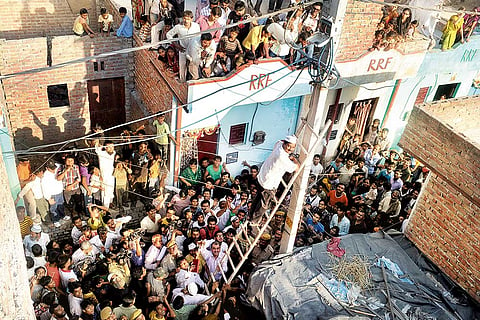
Arvind Kejriwal restores electricity connection in protest against faulty meters and inflated bills.
Prof Rajendra Pratap Gupta, a public policy expert who works on education, health and employment, too feels these polls will be a turning point in setting a political narrative. “It may reset the model for Indian politics. For the first time, the UEP (unique electoral proposition) has moved to health and education, something successive governments failed to deliver,” he says.
Gupta, who was involved in writing the BJP’s 2009 and 2014 poll manifestos, feels AAP’s policy thrust will resonate because of “the current socio-economic and job scenario, the majority of our population being young”. The BJP, which had swept the Lok Sabha elections this summer, winning all seven Delhi seats, seems to be fumbling for a counter-narrative. Its thrust on issues like Article 370 and Ayodhya proved to have limited appeal in the Haryana and Maharashtra assembly contests, so it’s likely to shift tack to local issues. That explains the Centre’s new bill—passed by the Lok Sabha, and introduced in the Upper House on December 4—to grant ownership rights to residents living in Delhi’s 1,731 unauthorised colonies.
Some 40-50 lakh people will benefit, says Union MoS for housing and urban development Hardeep Puri. For good measure, he accuses the AAP government of not doing anything in five years to regularise these colonies. The middle-class pro-Modi voter would once regularly pour scorn on AAP for its ‘pro-jhuggi policies’, so it’s interesting to see this turn.
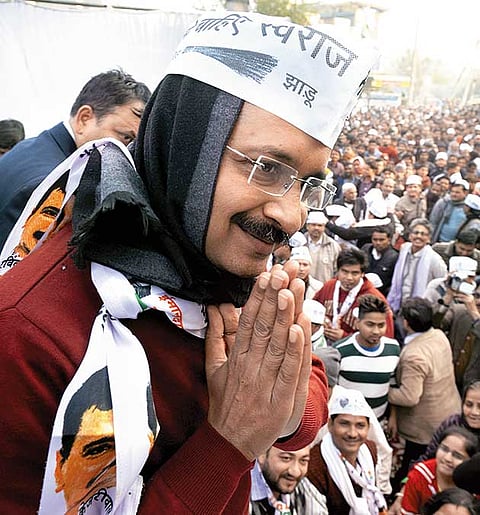
Kejriwal apologised to the people of Delhi for ‘letting them down’ with a 49-day stint.
But even as the BJP tries to target Kejriwal’s core base of the poor and lower middle class, party leaders are aware of its Delhi unit’s shortcomings. “We do not have a credible leader to project as the CM face,” admits a central BJP leader. Star Bhojpuri actor-singer Manoj Tiwari is one of their current bets: they hope his pop status will help woo the sizeable Poorvanchali community in Delhi, but pitted against Kejriwal, the deficit seems obvious. Also, “there’s too much infighting…it has plagued us in Delhi for over a decade and, unfortunately, is still not settled,” the leader rues.
BJP spokesperson Shazia Ilmi, formerly with AAP, puts up a brave front on this. “Everyone knows the kind of fights happening in AAP. It’s the same for all parties, that’s the nature of politics. But the Delhi BJP is very organised. Just because we haven’t named our CM candidate does not mean we are in disarray,” she says.
In 2013, the BJP had gone with veteran leader Dr Harsh Vardhan as the CM face—it emerged as the single largest party, but declined to form the government in a hung assembly. The first disastrous AAP-Congress dalliance had happened then, with Kejriwal’s tumultuous 49-day debut as CM ending in some high (and low) drama. In early 2015, the BJP pitted Kejriwal’s old India Against Corruption (IAC) associate Kiran Bedi against him, but got decimated. Its tally (3/70) became the first stinging electoral setback to Modi.
The Delhi voter also maxes out that old proverb about voting differently for assembly and Parliament: ‘Modi for PM, Kejriwal for CM’ was common wisdom. So the rollercoaster continued. In 2019, the BJP won all seven Lok Sabha seats in Delhi; AAP came third in five of them, its voteshare nearly halving to 18 per cent from 2014. Extrapolate those results to assembly: BJP 65, Congress five, AAP 0! Kejriwal is not unduly worried about that though, saying AAP is not a national player.
The Congress, meanwhile, seems to have been edged out of Delhi’s power axis. If its 2013 rout came on the back of a season of scam allegations, the decimation of 2015 and the continuing disarray betokens a bleak future. A former Congress MLA says their voters shifted en masse to AAP since they see Kejriwal as a better alternative to keep the BJP out of power. Some leaders see signs of revival. “We finished second in five LS constituencies, and our vote share was higher than AAP’s. If you look at the assembly-wise break-up, we finished first in over 10 seats and second in nearly two dozen seats. A huge improvement over 2014, when we finished a distant third on all seven seats,” says party veteran J.P. Aggarwal. But the momentum seems to have been lost after Sheila Dikshit’s demise. Infighting, its perennial bane, is gloriously alive: the latest chapter is between the new import, renegade BJP cricketer-politician Kirti Azad (again the Poorvanchali factor), and old local crustacean Subhash Chopra. The latter dismisses reports of differences with Azad as “a media creation”, but admits the task ahead “is definitely challenging.” How does he propose to meet the challenge? His reply sounds like a rehash of old rhetoric: “The Kejriwal government runs on publicity; AAP and BJP are alike, they lie to the people and will be taught a lesson.” Not exactly a picture of self-belief.
Experts tend to be more charitable. “The sense I get from the ground is people are happy with the government on the parameters of development and governance,” says Praveen Rai, political analyst with CSDS. “On most indicators, they have done a fairly good job.” This absence of an anti-incumbency factor may, of course, change once polls are declared, he concedes, for the BJP is sure to come up with a narrative—it would be up to AAP to counter that. “At the moment, it’s safe to say they are ahead of BJP. Free bus rides for women will help them a lot…for the lower income groups, it’s come as a boon. There’s no visible red mark against the AAP government. The BJP will find it difficult to come up with a strategy to trump all the work Kejriwal has done. In fact, Kejriwal has almost created a Ramrajya. He is also adopting soft Hindutva. He has made everything free, including pilgrimages,” he adds.
Surprising metaphors for a governance party? Soft Hindutva, pilgrimages, Rajya Sabha tickets to old Vaishya figures on the local circuit…Kejriwal’s Ramrajya is obviously made up of a few things beyond bijli, paani, school and clinic. Plus ca change? Or necessary evil? Delhi will decide, and India is watching.
***
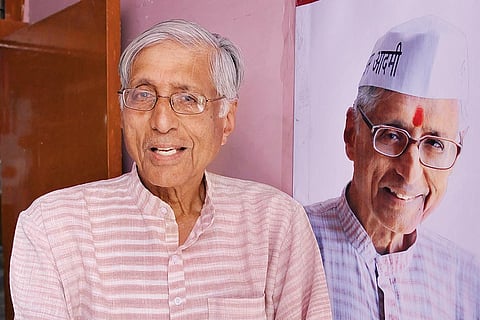
Rajmohan Gandhi
Author, historian, professor and Mahatma Gandhi’s grandson
AAP has seen ups and downs, and some splits that have saddened many people. Nonetheless, I gather from my interactions with people that there is heartfelt appreciation for AAP’s work, especially on the clinic and school front, where its performance has been pretty remarkable. When it comes to the fight against corruption, there is cause for dissatisfaction. But then maybe it was an unrealistic expectation. It will be a good signal for a party to get reelected on the basis of what it has done. It would be very healthy for democratic politics.
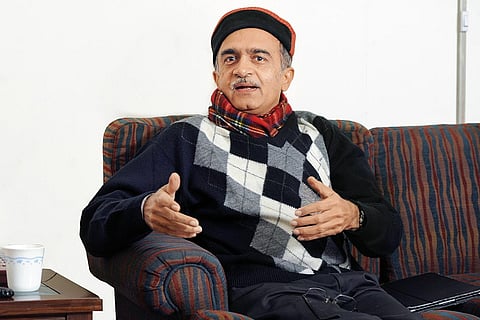
Prashant Bhushan
Senior lawyer and one of AAP’s co-founders, expelled in 2015 for ‘anti-party activities’
The impression is that AAP has done a lot to improve education and health. I have not studied these two sectors in detail, so it’s not fair to comment. However, the Kejriwal government has done nothing on anti-corruption or Jan Lokpal. The bill it brought was weaker than the original. So it has failed on the very plank it came to power on. It still doesn’t have a proper system to redress public grievances. It has misused public funds on advertising and publicity. It has failed to introduce transparency in the functioning of party and government. It is yet to formulate a self-regulation policy. An anti-democratic party in control of one man, AAP has become like any conventional party, even worse. There is no question of my return.

Vishal Dadlani
Music composer and AAP sympathiser
I am not a political entity, but I believe in what AAP is doing. I think it will win Delhi. I don’t see the filth in Delhi elections that I see in other states. Here people are talking about schools, hospitals, bijli-paani, infrastructure. AAP is doing what a government is meant to do—provide for the people. This is good for India.
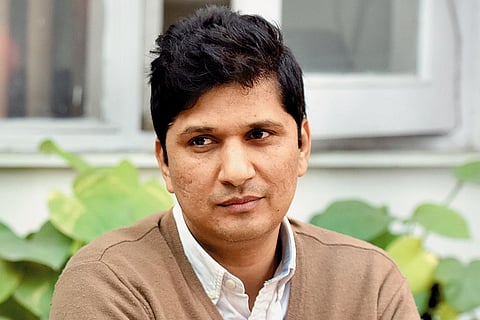
Saurabh Bhardwaj
AAP MLA
If you walk around Delhi, you will hear people talking about our work. Normally, a government that ruled a state for almost five years will face anti-incumbency. But here, even a BJP or Congress supporter will say that AAP has done work in education, health and other fronts. We don’t see anti-incumbency anywhere.
By Bhavna Vij-Aurora with Preetha Nair and Puneet Nicholas Yadav